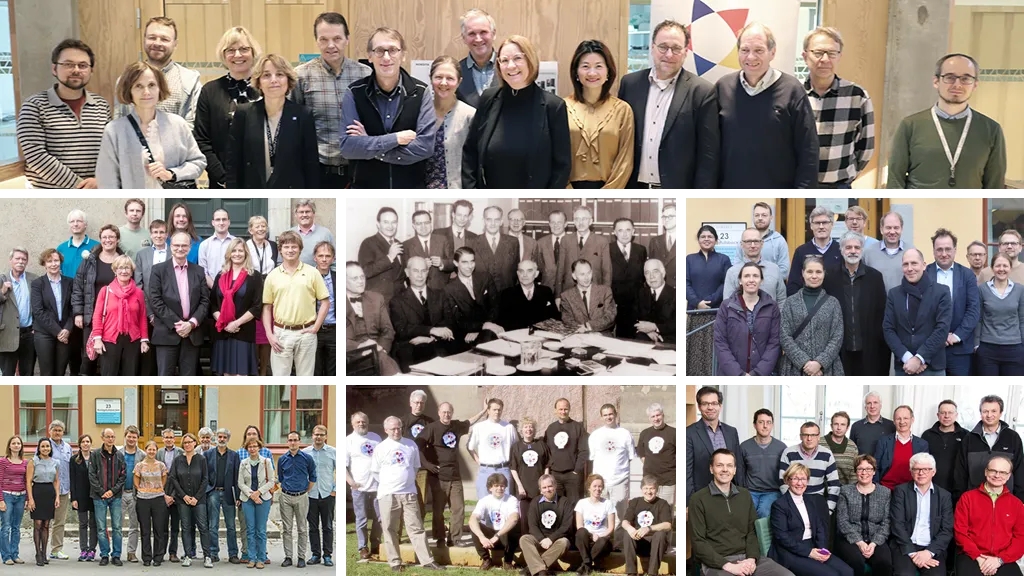Nordita's scientific staff includes a director, a deputy director, 4 permanent professors, 10 - 12 assistant professors, 25 - 30 postdoctoral fellows, and several graduate students working with Nordita faculty
Governing Board
Nordita has a governing Board, appointed jointly by the President/Vice-chancellor of the host universities KTH and Stockholm University, with one representative and one alternate member from each of the five Nordic countries, nominated by the respective research councils.
The Chairperson of the Board is nominated by the Joint Committee of the Nordic Natural Science Research Councils, NOS-N.
The tasks of the Board include long-range planning, approving the annual budget, and deciding appointments of scientific staff following an agreed-on procedure with the host universities.

Director and Deputy Director
The Nordita board nominates a Director who is appointed by the President/Vice-chancellor of KTH and Stockholm University. The director provides scientific leadership and is responsible for the day-to-day administration of the institute.
The Nordita board appoints a Deputy Director to work with the Director.
Research Subfield Committees
The Nordic physics community provides direct input into Nordita's scientific activities through four Nordic Research Subfield Committees, appointed by the Nordita board, each of which has five Nordic physicists. The tasks of the Research Committees include evaluating post-doctoral fellowship applications and scientific program proposals, and providing expert advice in their respective areas.
Advisory Committee
Nordita has a Scientific Advisory Committee of prominent scientists from the international physics community. Since its formation in 2007, the Scientific Advisory Committee has visited Nordita twice, in August 2007 and 2008, and met with academic and administrative staff along with members of the Nordita Board.
At these meetings, the Scientific Advisory Committee has reviewed and commented on a wide range of issues concerning Nordita in Stockholm and provided valuable input into Nordita's research strategy and future plans. Committee members are also being consulted between meetings via e-mail.
Program Committee
Nordita arranges a large number of scientific programs, extended workshops of up to 4 weeks, with a wide array of subjects in theoretical physics and affiliated subjects. Each year, with a deadline in November or December, the scientific community is invited to submit proposals for future scientific programs.
It is the task of the Nordita programs committee to make an independent review of the submitted program proposals. Based on the report and recommendations of the committee, the Nordita board then decides which programs will be funded.
Program Committee Members

Ulf
Gran
Professor
Chalmers University of Technology, Sweden
(High-Energy Physics)
Appointed 2022

Ruth
Gregory
Professor, Head of Department of Physics
King's College, London, UK
(Gravity and Cosmology)
Appointed 2022

Joachim
Krug
Professor
University of Cologne, Germany
(Statistical Physics)
Appointed 2022

Steven
Simon
Professor
Oxford University, UK
(Condensed Matter Physics, chair)
Appointed 2022
Nordita EDI Committee
Equality, Diversity and Inclusion (EDI) committee at Nordita
Equality, Diversity and Inclusion (EDI) committee at Nordita The EDI committee at Nordita strongly believe that there is both a moral and scientific incentive for creating an equal, diverse, and inclusive workplace. The goal of the committee is to increase the number of Nordita employees from marginalised groups and to create a positive work environment where everyone feels welcome.
Such a work environment can be achieved by acknowledging and tackling systemic inequalities that affect our community. The EDI committee seeks to be the reference point for everyone at Nordita to raise and address issues regarding ethnicity, disability, sex, gender identity and expression, religion and other beliefs, sexual orientation, and age, as defined by the Swedish Discrimination Act.
The goals of the EDI committee are:
- To hold a continuous dialogue with the Nordita board in order to suggest practical and tangible solutions to EDI issues.
- To collaborate with the Administration Team and the Director at Nordita to identify concrete and applicable ways to address EDI issues.
- To work with the "arbetsmiljöombud" at Nordita to establish procedures for raising concerns regarding EDI at Nordita.
- To assess and monitor the EDI status at Nordita through the collection of data, creation of key metrics and preparation of reports on a regular basis, to be specified.
- To connect with other EDI groups in similar communities in order to provide online resources and training opportunities for everyone working in Nordita.
- To identify best practices in order to create a more diverse community of people at Nordita.
- To create recommendations for embedding EDI values in outwards-facing initiatives, such as the Nordita Scientific Programs and outreach.






